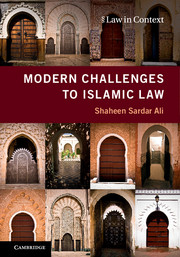Book contents
- Frontmatter
- Dedication
- Contents
- Acknowledgements
- Glossary
- Table of Cases
- Table of Legislation
- Introduction
- 1 Sharia: The Flowing Stream
- 2 An Elephant in the Room or a Needle in a Haystack? Searching for ‘Islamic’ Constitutionalism(s)
- 3 Contextualizing Family Law Reform and Plural Legalities in Post-colonial Pakistan
- 4 In Search of Legitimacy: The Dilemma of Islamic Finance
- 5 Muslim Women's Contributions to Drafting CEDAW: An Untold Narrative
- 6 CEDAW? What's That? ‘Domesticating’ ‘International’ Women's Human Rights in Muslim Jurisdictions: Reflections on Pakistan's Engagement with CEDAW
- 7 ‘Between the Devil and the Deep Blue Sea’: Sharia Councils and Muslim Women's Rights in the British Muslim Diaspora
- 8 Internet Fatawa: Challenging Tradition and Modernity in Women and Gender Issues
- Conclusion
- Bibliography
- Index
6 - CEDAW? What's That? ‘Domesticating’ ‘International’ Women's Human Rights in Muslim Jurisdictions: Reflections on Pakistan's Engagement with CEDAW
Published online by Cambridge University Press: 05 September 2016
- Frontmatter
- Dedication
- Contents
- Acknowledgements
- Glossary
- Table of Cases
- Table of Legislation
- Introduction
- 1 Sharia: The Flowing Stream
- 2 An Elephant in the Room or a Needle in a Haystack? Searching for ‘Islamic’ Constitutionalism(s)
- 3 Contextualizing Family Law Reform and Plural Legalities in Post-colonial Pakistan
- 4 In Search of Legitimacy: The Dilemma of Islamic Finance
- 5 Muslim Women's Contributions to Drafting CEDAW: An Untold Narrative
- 6 CEDAW? What's That? ‘Domesticating’ ‘International’ Women's Human Rights in Muslim Jurisdictions: Reflections on Pakistan's Engagement with CEDAW
- 7 ‘Between the Devil and the Deep Blue Sea’: Sharia Councils and Muslim Women's Rights in the British Muslim Diaspora
- 8 Internet Fatawa: Challenging Tradition and Modernity in Women and Gender Issues
- Conclusion
- Bibliography
- Index
Summary
Introduction
Chapter 5 provided the untold narrative of a complex and nuanced process of Muslim women's contribution to the drafting of CEDAW. This chapter investigates the extent to which CEDAW finds a place in governmental and non-governmental policy documents, legislation, judicial decisions, governance structures and institutions in Pakistan. It poses the question whether CEDAW's pre- and post-ratification processes and attendant discourse have ‘domesticated’ it within state, government and society in that jurisdiction. The study suggests that in a country where pluralism is deeply embedded in legal culture as well as in religious and cultural norms, human rights instruments in general and CEDAW in particular receive an ambivalent and mixed reception as the newest layer of plural legalities.
This chapter draws upon a variety of governmental and non-governmental sources, and upon surveys of judicial decisions of the high courts and the Supreme Court that have invoked CEDAW since Pakistan's ratification in 1996, and is informed by academic literature on the approach of Pakistan and other Muslim states to CEDAW. I was a participant in the accession process and draw upon those personal experiences in developing the present study. This chapter has also benefited from discussions and personal communications with members of the Pakistani NGO communities, in particular those involved in the thirty-eighth session of the CEDAW Committee, in 2007, where Pakistan's country reports were under discussion.
As mentioned in Chapter 5, literature on CEDAW focuses on the post-ratification scene, especially in Muslim states due to the far-reaching reservations entered by them citing Islamic law and sharia. Hence there is a need to take a step back and explore the pre-ratifications debates and discourse and then link them to the post-ratification situation. The present chapter attempts to undertake this task using Pakistan as an example.
CEDAW within a Religious, Cultural and Socio-legal Context
Since its inception as an independent nation in 1947, Pakistan has struggled with multiple strands of its identity (religious, cultural, ethnic, linguistic) and the manner in which these inform conceptions of state, government, law and society, as well as the status of women.
- Type
- Chapter
- Information
- Modern Challenges to Islamic Law , pp. 184 - 205Publisher: Cambridge University PressPrint publication year: 2016



